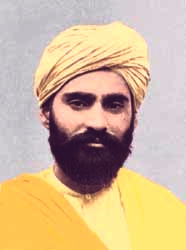A Quote by Sathya Sai Baba
Devotional singing induces in you a desire for experiencing the truth, to glimpse the beauty that is God, to taste the bliss that is the Self. It encourages man to dive into himself and be genuinely his real Self.
Related Quotes
Two ideas are psychologically deep-rooted in man: self-protection and self-preservation. For self-protection man has created God, on whom he depends for his own protection, safety and security, just as a child depends on its parent. For self-preservation man has conceived the idea of an immortal Soul or Atman, which will live eternally. In his ignorance, weakness, fear, and desire, man needs these two things to console himself. Hence he clings to them deeply and fanatically.
In the present age, man proves his separation from his Creator by his spirit of self-sufficienc y and positive rejection of God. The present issue between God and man is one of whether man will accept God's estimate of him, abandon his hopeless self-struggle, and cast himself only on God who alone is sufficient to accomplish his needed transformation.
The experience of not forgetting consciousness alone is the state of devotion which is the relationship of unfading real love, because the real knowledge of Self, which shines as the undivided supreme bliss itself, surges up as the nature of love. Love itself is the actual form of God. That is pure bliss. Call it pure bliss, God, Self, or what you will. That is devotion, that is realization and that is everything.
James says, "You desire and do not have; so you kill" (Jas. 4:2). We kill marriages and we kill unborn babies because they cut across our desires; they stand in the way of our unencumbered self-enhancement. And we live in a culture where self-enhancement and self-advancement is god. And if self-enhancement is god, then the One who is at work in the womb shaping a person in His own image is not God and the assault on His work is not sacrilegious, but obedience to the god of self.
Perhaps the greatest barrier to revival on a large scale is the fact that we are to interested in a great display. We want an exhibition; God is looking for a man who will throw himself entirely on God. Whenever self-effort, self-glory, self-seeking or self-promotion enters into the work of revival, then God leaves us to ourselves.
Only to the extent that someone is living out this self transcendence of human existence, is he truly human or does he become his true self. He becomes so, not by concerning himself with his self's actualization, but by forgetting himself and giving himself, overlooking himself and focusing outward.
Self-observation brings man to the realization of the necessity of self-change. And in observing himself a man notices that self-observation itself brings about certain changes in his inner processes. He begins to understand that self-observation is an instrument of self-change, a means of awakening.
An honest self-portrait is extremely rare because a man who has reached the degree of self-consciousness presupposed by the desire to paint his own portrait has almost always also developed an ego-consciousness which paints himself painting himself, and introduces artificial highlights and dramatic shadows.
It is man's intrinsic and irreducible self-responsibility to humanize himself, to exercise his entire range of rational and moral resources to raise his mode of being and seeing and acting above not just that of animals, but also above that of the majority of subhuman (never to be self-realized) humans who will never draw themselves into a self-punishing position of focal self-diagnosis and self-accountability.
Lord Krishna... proclaims Self-realization, true wisdom, as the highest branch of all human knowledge-the king of all sciences, the very essence of dharma ("religion")-for it alone permanently uproots the cause of man's threefold suffering and reveals to him his true nature of Bliss. Self-realization is yoga or "oneness" with truth-the direct perception or experience of truth by the all-knowing intuitive faculty of the soul.
My doctrine means that I must identify myself with life, with everything that lives, that I must share the majesty of life in the presence of God. The sum-total of this life is God. .. Man is not at peace with himself until he has become like unto God. The endeavor to reach this state is the supreme, the only ambition worth having. And this is self-realisation. This self-realisation is the subject of the Gita, as it is of all scriptures... to be a real devotee is to realise oneself. Self-realisation is not something apart.










































